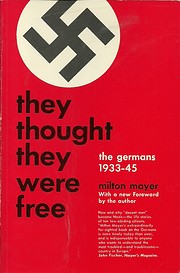

Klik op een omslag om naar Google Boeken te gaan.
|
Bezig met laden... They Thought They Were Free: The Germans, 1933-45door Milton Mayer

Geen Bezig met laden...
Meld je aan bij LibraryThing om erachter te komen of je dit boek goed zult vinden. Op dit moment geen Discussie gesprekken over dit boek.   ) )Libro estremamente interessante, soprattutto quando si focalizza sulle vicende e i colloqui con i dieci "piccoli uomini" tedeschi scelti come casi di studio. Ovviamente datato e superato dagli eventi dei decenni successivi nell'ultima parte, quando affronta temi di carattere più generale. Da leggere comunque nella prospettiva storica di un libro pubblicato nel 1955. Mayer, recrea su paso por una pequeña ciudad alemana donde pocos años después de la guerra socializa con "gente del común", y su visión del nazismo. Sobrecogedor recuerdo de como se puede terminar sintiendo como normal el horror, y la capacidad de negación del ser humano. Luego cuando habla del temor a los "demonios" de los alemanes, resulta muy interesante pero tal vez algo desactualizado con la caída del muro. Muy bueno Really insightful and definitely unnerving in its relevance to what's happening with regards to immigrants and asylum seekers at the southern border of the U. S. right now. My only real issue with this book is that the author's religious and anti-socialist bias tends to pour over into his commentary at times. geen besprekingen | voeg een bespreking toe
Prijzen
First published in 1955, They Thought They Were Free is an eloquent and provocative examination of the development of fascism in Germany. Milton Mayer's book is a study of ten Germans and their lives from 1933-45, based on interviews he conducted after the war when he lived in Germany. Mayer had a position as a research professor at the University of Frankfurt and lived in a nearby small Hessian town, which he disguised with the name "Kronenberg." "These ten men were not men of distinction," Mayer noted, but they had been members of the Nazi Party; Mayer wanted to discover what had made them Nazis. Geen bibliotheekbeschrijvingen gevonden. |
Actuele discussiesGeenPopulaire omslagen
 Google Books — Bezig met laden... Google Books — Bezig met laden...GenresDewey Decimale Classificatie (DDC)943.086History and Geography Europe Germany and central Europe Historical periods of Germany Germany 1866- Third Reich 1933-1945LC-classificatieWaarderingGemiddelde: (4.01) (4.01)
Ben jij dit?Word een LibraryThing Auteur. |
||||||||||||||||||||||||||||||||||||||||||||||||||||||||||||||||||||||||||||||||||||||||||||||||||||||||||||||||||||||||||